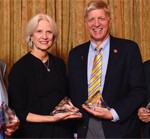Take the challenge. D—Even though the patient’s chief complaint is for a follow-up of chronic idiopathic gout without tophi, the patient is presenting with an acute flare of idiopathic gout of the left knee. Acute gout and chronic gout have specific coding guidelines, because they each have an Excludes 1 note. This indicates they are…

Federal Compliance Mandates for Medical Practices
Approximately 10 years ago, the Office of Inspector General (OIG) issued its first guidance on compliance as it relates to federal mandates for physician practices. Although taking the necessary steps can be a daunting task in an era of complex rules and heightened regulations, there are key areas of government-mandated compliance requirements that practices should…
Important Changes to the Meaningful Use Hardship Exception
As a result of recent Medicare legislation, the Center for Medicare & Medicaid Services (CMS) has launched important changes to the Meaningful Use hardship exception process, featuring a more streamlined application process. These changes will reduce the burden on eligible professionals (EPs) by condensing the application process and decreasing the amount of information that must…

Patients Are Essential to Grassroots Advocacy
In 2015, ACR members were powerful advocates on important issues affecting public health and rheumatology. But we should not forget about an important resource—patients, each of whom can bring unique perspectives to legislators in Washington, D.C. Working together, our voices are stronger. Here’s how your patients can work with the ACR to advocate for their health and rheumatology…
Medicare Drug Coverage Plans for Rheumatologic Medications
Different parts of Medicare cover different services. For outpatient prescription drugs, Medicare has two distinct programs with a maze of complex policies. Most physicians along with Medicare patients, retail pharmacies, Medicare drug plans as well as Medicare Advantage health plans continuously struggle with navigating Medicare drug coverage under Part B and Part D. There are…
The ACR’s Current Healthcare Policy Priorities
The ACR advocates on behalf of rheumatologists, rheumatology health professionals and the rheumatology community through involvement in federal and state legislation and regulatory action, participation in hearings and education of lawmakers on issues important to rheumatologists, health professionals and patients. Through robust federal and state advocacy programs, the ACR engages lawmakers and informs them of…
Rheumatology Coding Corner Questions: ICD-10 Coding Guidelines, Conventions Refresher Quiz Part 1
What is the ICD-10 guideline to code for osteoporosis without a current pathological fracture? There is no rule. Code for the osteoporosis, and code for the pathological fracture. Code for the osteoporosis from the M81._ category, and code for the history of a pathological fracture. None of the above is correct. How many characters are…
Rheumatology Coding Corner Answers: ICD-10 Coding Guidelines, Conventions Refresher Quiz Part 1
Take the challenge. C—The guideline for coding from category M81._ is that an additional code is needed if the physician has knowledge that the patent had a past pathological fracture. The code for personal history of (healed) pathological fracture is Z87.310. B—Osteoporosis with a current pathologic fracture is one of the few ICD-10 codes that…
The ACR’s Legislative Action Center Ensures Rheumatology’s Voice Is Heard in Washington
It’s easier than ever to become a part of advocacy efforts at the federal and state levels. Visit the ACR’s new Legislative Action Center to send a personalized message to your lawmakers, asking them to give patients access to treatments, to provide funding for biomedical research and to prevent insurer practices from interfering with treatment…

Rheumatology Research Foundation Launches Honorary Board of Advisors
Nearly 150 of the Rheumatology Research Foundation’s most generous supporters gathered in November during the 2015 ACR/ARHP Annual Meeting for the Donors of Merit recognition event. In celebration of the Foundation’s 30th Anniversary in 2015, the event reflected on the journey to advance treatments and improve patient care. The Foundation’s president, David Karp, MD, PhD,…
- « Previous Page
- 1
- …
- 46
- 47
- 48
- 49
- 50
- …
- 135
- Next Page »